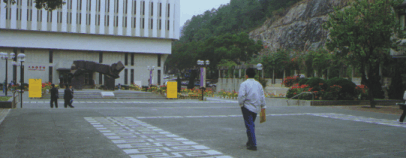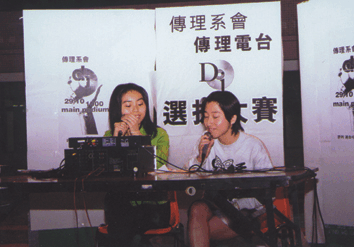Like a bridge over the universityCampus ‘radio’ to add colour and fun to monotonous academic lifeBy Dawn Chan Baptist University’s Wong Wing-hong and Chan Yuk-ting, students of digital graphic communications, plan to revive a defunct campus “radio station”. They explained their experiences in reviving the station. “In fact, our campus radio was established almost 6 years ago and we are just following the tradition — to offer a medium of expression for students,” Mr. Wong said.
Photo by Joanna LamAnother objective of the programme is to introduce local culture to the audience. “We will interview guests from cultural fields — performers, film directors and musicians. We hope that we can arouse students’ interest in local cultural developments,” he said. The campus radio station, named the Communication Radio Station, will be quite different from an ordinary radio station. “The main difference between the two is that we won’t broadcast the programmes on the airwaves,” Mr. Wong said. He said the radio station will actually be a platform at the main podium of the campus. Thus, the radio’s hosts will conduct programmes face-to-face with the audience. The means of broadcasting excepted, it will try otherwise to model itself after a genuine radio station.
Courtesy of the Communications Society of Baptist University“Just like a local radio station, we will have a disc jockey to host the programmes. “Moreover, insofar as resources are available, we have developed a variety of programmes to satisfy our audience’s needs,” Ms Chan explained. Ms Chan said their radio station will focus on music programmes and interviews with celebrities. Moreover, it will act as a news channel for the School of Communication at the University. “Therefore, the role of the radio station will be very important — it not only will provide entertainment to the students, but also serve as a bridge between the students and the school,” Ms Chan said. The workload of the radio station is heavy. “As we have to shoulder the responsibilities of being both students and (radio station) operators, it is sometimes unavoidable that schoolwork will be affected,” Mr. Wong said with a bitter smile. There are only two members of the Communication Society who have agreed to take up the preparation work for campus radio, which is anticipated to be reopened early this year. Although members of the Cinema and Television Department will help them with the use of equipment, they said they still have to handle an enormous amount of work. Another problem the student operators face is the limited broadcasting radius. “Since programmes are not broadcast (over airwaves), we are not able to expand the broadcasting area beyond the main podium. As a result, fewer students can listen to our programmes,” Mr. Wong claimed. “We don’t expect the Office of Students’ Affairs will complain that the volume is too high during broadcasting. Unfortunately, such cases have happened. Indeed, there are no written regulations about a suitable level of volume for us to follow,” he continued. Still, there are students who are willing to take up the challenge. Ms Ester Pang Kwok Yan, a Year 1 student majoring in public relations and advertising, is one of them. Ms Pang participated in a disc jockey selection campaign 1997, held by the university’s Communication Society. She was one of the three winners who will become campus radio’s DJs. “Being a DJ is really a very challenging task, as you have to respond immediately. Also it is not easy to create a comfortable atmosphere for the audience and interviewees,” Ms Pang said. While Baptist University launched campus radio about 6 years ago, students at The Chinese University of Hong Kong are taking their first step to establish their own campus radio. “We want to offer a channel for our fellow schoolmates to communicate,” said Mr. Steve Yeung Hoi Wai, the recreational executive of the university’s Student Union. The Student Union has set up a preparatory committee focusing on the launching of campus radio. Unlike Baptist University, they hope the programmes will be broadcast over the airwaves. “This way all people on the campus could listen,” he said. Concerning the contents of the programmes, Mr. Yeung claimed that they will not concentrate only on music. “News of the campus and social issues will also be our focuses, as they are the aims of campus radio — to encourage students to speak up and be aware of things happening around us." Nevertheless, many aspects of the plan are not in place yet. Because of a limited budget, they have sought help from local radio stations. “However, up to this moment, we have not received any reply.” According to the Tele-communication Ordinance, broad-casting will only be allowed if it means transmitting sound for “general reception” by means of radio waves. Since the target of the proposed campus radio is a specific audience, the Telecommunication Authority cannot assign any broadcasting frequency to them. “Despite the situation, we will modify our proposal and apply for the use of a frequency again. But I do think it takes time to do,” said Mr. Yeung. “We have recruited almost 20 student volunteers to help us with the creation of programmes. They all show determination to do the job well,” said Mr. Yeung. “I think the idea is great,” said Ms Joe Tung Man Shui, a Year 2 student studying public relations and advertising at Baptist University. She explained, “The student operators can gain precious experiences as they are in charge of the whole project.” Mr. Charles Sin Chun, a 20-year-old finance student at Baptist University, agrees that the radio station will be a positive development. “Campus radio would provide chances for the students to develop their potential. Books can’t train people to become independent. But by joining activities such as the campus radio station, we can achieve this goal,” said he. Nonetheless, he expected campus radio will not become really popular at universities. “Nowadays, students would rather go shopping or sing karaoke than stay on the campus. Who will bother to stand for 20 minutes and listen to radio’s programmes?” On the other hand, Mr. Au Yeung Yeu Fung, a Year 1 student studying physics at The Chinese University of Hong Kong, offered a solution. “As the name indicates, campus radio should be different from an ordinary radio station in terms of programming. It would great if there were a phone-in programme for the students to express their views,” he suggested. [McMug and Friends to Debut on iTV] |

